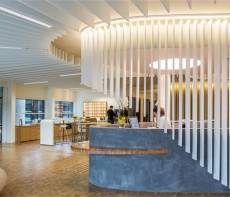September 19, 2014
Universal application of open plan has led to global privacy crisis, claims report
 A major new report from office furniture maker Steelcase claims that the universal provision of open plan offices means that organisations are facing an unprecedented privacy crisis with their employees. The claim is based on international research carried out by market researchers IPSOS and the Workspace Futures Team of Steelcase which found that a remarkable 85 percent of people are dissatisfied with their working environment and cannot concentrate. Nearly a third (31 percent) now routinely leave the office to get work done in private. The authors of the report claim that this does not mean a reversal of the decades long shift away from cellular offices but rather a move to create offices that offer a range of work settings to give people a choice of where and how to work. More than 10,000 workers across 14 countries were questioned about their office environments and working patterns.
A major new report from office furniture maker Steelcase claims that the universal provision of open plan offices means that organisations are facing an unprecedented privacy crisis with their employees. The claim is based on international research carried out by market researchers IPSOS and the Workspace Futures Team of Steelcase which found that a remarkable 85 percent of people are dissatisfied with their working environment and cannot concentrate. Nearly a third (31 percent) now routinely leave the office to get work done in private. The authors of the report claim that this does not mean a reversal of the decades long shift away from cellular offices but rather a move to create offices that offer a range of work settings to give people a choice of where and how to work. More than 10,000 workers across 14 countries were questioned about their office environments and working patterns.
























July 16, 2014
Keeping remote employees motivated is key to successful flexible working culture
by Gemma Falconer • Comment, Flexible working, Workplace
Flexible working has barely been out of the news since the latest government changes. But while allowing employees to work remotely can do wonders for staff retention, motivating them and keeping them in the loop presents a new problem. Although self-starting employees feel that they have more control over their work and fewer distractions, it can also lead to a sense of isolation. It is important for retention that you not just offer a flexible working option to employees, but that all the staff make an effort to continue allowing them to feel like a part of the team. The four best practices that will help you motivate employees that telecommute are: ensuring you build trust between those who telecommute and their colleagues from the start; establish regular communication between remote and in-office staff; manage goals, expectations and outcomes and take steps to establish that remote working is made part of the company culture. (more…)